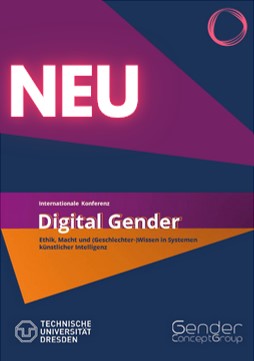Plattformversprechen zurückweisen
Eine geschlechtsspezifische Neuformulierung digitaler Vorstellungswelten
DOI:
https://doi.org/10.17169/ogj.2023.214Schlagworte:
Digitale Kulturen, Digitale Plattformen, Gewalt gegen Frauen, Soziale MedienAbstract
Plattformen sind zuletzt in den Blick von Politik und Wissenschaft gerückt, wobei allerdings geschlechtsspezifische Praktiken und deren Materialität wenig Aufmerksamkeit geschenkt wird. Obwohl Geschlecht auf diesen Plattformen präsent ist, wird es bei der Analyse plattformbasierter Praktiken nicht immer mitgedacht oder gar als entscheidender Faktor berücksichtigt.
Mit dem Konzept der Plattformversprechen lässt sich untersuchen, wie Genderpolitiken in der Logik und Infrastruktur der Plattformen verankert sind. Ich schlage vor, dass wir aufhören, Plattformen als technische Artefakte, auf denen die Bedingungen von Geschlecht operationalisiert werden, zu betrachten. Diese Sichtweise lässt uns glauben, dass geschlechtsspezifische und sexuelle Gewalt im Internet ein Ausnahmezustand sei, der durch bessere Regulierung und Governance behoben werden könne.
Ich schlage vor, dass wir Gender als diskursive wie auch analytische Kategorie nutzen, um den Diskurs über Plattformen neu zu schreiben und die Versprechen der Plattformen zu erkennen, die in den vorherrschenden Erzählungen als selbstverständlich angesehen und nicht in Frage gestellt werden.
Literaturhinweise
Abidin, Crystal (2018): Internet Celebrity. Understanding Fame Online. Bingley: Emerald. doi: 10.1108/9781787560765
Association for Progressive Communications (2017): Online Gender-Based Violence. A Submission from the Association for Progressive Communication to the United Nations Special Rapporteur on Violence Against Women, its Causes and Consequences. https://www.apc.org/en/pubs/online-gender-based-violence-submission-association-progressive-communications-united-nations (07.10.2023).
Association for Progressive Communications (2016): Feminist Principles of the Internet. Version 2.0. https://www.apc.org/en/pubs/feminist-principles-internet-version-20 (07.10.2023).
Arkenbout, Chloë/Wilson, Jack/de Zeeuw, Daniel (Ed.) (2021): Critical Meme Reader. Global Mutations of the Viral Image. Amsterdam: Institute of Network Cultures. doi: 10.25969/mediarep/19281
Arun, Chinmayi/Prasad, Smitha Krishna (2018): Towards a Data Protection Framework. Social Science Research Network. doi: 10.2139/ssrn.3151222
Auslander, Philip (2012): Digital Liveness. A Historico-Philosophical Perspective. In: PAJ. A Journal of Performance and Art 34 (3), 3–11. doi: 10.1162/PAJJ_a_00106
Barabási, Albert-László (2002): Linked. The New Science of Networks. Cambridge: Perseus.
Benkler, Yochai (2006): The Wealth of Networks. How Social Production Transforms Markets and Freedom. New Haven: Yale University Press.
Chun, Wendy Hui Kyong (2021): Discriminating Data. Correlation, Neighbourhoods and the New Politics of Recognition. Cambridge: MIT Press. https://doi.org/10.7551/mitpress/14050.001.0001
Chun, Wendy Hui Kyong/Friedland, Sarah (2015): Habits of Leaking. Of Sluts and Networks Cards. Differences 26 (2), 1–28. doi: 10.1215/10407391-3145937
Datta, Ayona (2020): Self(ie)-Governance. Technologies of Intimate Surveillance in India under COVID-19. In: Dialogues in Human Geography 10 (2), 234–237. doi: 10.1177/204382062092979
Dibbell, Julian (1993): A Rape in Cyberspace: How an Evil Clown, a Haitian Trickster Spirit, Two Wizards, and a Cast of Dozens Turned a Database into a Society. http://www.juliandibbell.com/texts/bungle_vv.html (07.10.2023).
Dutta, Prabhash (2022): Who are Trads, the dangerous group Bulli Bai founder belongs to? https://www.indiatoday.in/india/story/trads-dangerous-group-bulli-bai-founder-sulli-deals-1898457-2022-01-11 (07.10.2023).
Galloway, Alexander R. (2006): Protocol. How Control Exists after Decentralization. Cambridge: MIT Press.
Ganesh, Maya Indira (2017): Entanglement. Machine Learning and Human Ethics in Driver-less Car Crashes. In: APRJA. A Peer-Reviewed Journal about Minor Tech 6 (1), 7–87. doi: 10.7146/aprja.v6i1.116013
Gibson, William (1984): Neuromancer. New York: Penguin Putnam.
Gillespie, Tarleton (2017): The Platform Metaphor, Revisited. In: Culture Digitally. https://www.hiig.de/en/the-platform-metaphor-revisited/ (07.10.2023).
Haugen, Frances (2021): Statement of Frances Haugen. Whistleblower Aid. Unites States Senate Committee on Commerce, Science and Transportation. https://www.commerce.senate.gov/services/files/FC8A558E-824E-4914-BEDB-3A7B1190BD49 (07.10.2023).
Helmond, Anne (2015): The Platformisation of the Web. Making Web Data Platform Ready. In: Social Media + Society 1 (2). doi: 10.1177/2056305115603080
Iyer, Neema/Nyamwire, Bonnita/Nabulega, Sandra (2020): Alternate Realities, Alternate Internets. African Feminist Research for A Feminist Internet. Pollicy. https://ogbv.pollicy.org/report.pdf (07.10.2023).
Jasanoff, Sheila/Kim, Sang-Hyun (Ed.) (2015): Dreamscapes of Modernity. Sociotechnical Imaginaries and the Fabrication of Power. Chicago: University of Chicago Press. doi: 10.7208/chicago/9780226276663.001.0001
Juhasz, Alexandra/Shah, Nishant (2021): Introduction. In: Juhasz, Alexandra/Langlois, Ganaele/Shah, Nishant (Ed.): Really Fake. In Search of Media. Minneapolis: University of Minnesota Press, Lüneburg: Meson Press, ix–xii.
Kayyali, Dia (2015): New Report Shows European Data Protection Authorities are Taking Facebook’s Questionable Terms of Service Seriously’. https://www.eff.org/es/deeplinks/2015/02/new-report-shows-european-data-protection-authorities-are-taking-facebooks (07.10.2023).
Kim, Kelly (2020): Recent Debates on Data Utilisation and Protection. 3 Data Laws and Lee Luda. In: Shah, Nishant (Ed.): Platform Futures. Data Opportunities and Challenges. Hong Kong: Digital Asia Hub, 13–35. https://www.digitalasiahub.org/small-books-for-big-platforms.
Kittler, Friedrich A. (2014): The Truth of the Technological World. Essays on the Genealogy of Presence, 219–229. Translated by Erik Butler. Redwood City: Stanford University Press. doi: 10.1515/9780804792622-016
Losh, Elizabeth (2016): Hiding Inside the Magic Circle. Gamergate and the End of Safe Space. https://www.boundary2.org/2016/08/elizabeth-losh-hiding-inside-the-magic-circle-gamergate-and-the-end-of-safe-space (07.10.2023).
Malhotra, Namita (2015): Good Questions on Technology-Related Violence. https://www.apc.org/en/pubs/good-questions-technology-related-violence.
Manovich, Lev (2001): The Language of New Media. Cambridge: MIT Press.
O’Neil, Cathy (2016): Weapons of Math Destruction. How Big Data Increases Inequality and Threatens Democracy. New York: Crown.
Pandey, Geeta (2021): Sulli Deals. The Indian Muslim women ‘up for sale’ on an app. https://www.bbc.com/news/world-asia-india-57764271 (07.10.2023).
Perez, Sarah (2022): Consumers Swap Period Tracking Apps in Search of Increased Privacy Following Roe v. Wade Ruling’. https://techcrunch.com/2022/06/27/consumers-swap-period-tracking-apps-in-search-of-increased-privacy-following-roe-v-wade-ruling (07.10.2023).
Philip, Kavita/Irani, Lilly/Dourish, Paul (2010): Postcolonial Computing. A Tactical Survey. In: Science, Technology, & Human Values 37 (1), 3–29. doi: 10.1177/0162243910389594
Poell, Thomas/Nieborg, David/van Dijck, José (2019): Platformisation. In: Internet Policy Review 8 (4), 1–13. doi: 10.14763/2019.4.1425
Prasad, Smitha Krishna (2021): Covid-19 and Public Health Platforms in India. In: Shah, Nishant (Ed.): Platform Futures. Data Opportunities and Challenges. Hong Kong: Digital Asia Hub, 53–73. https://www.digitalasiahub.org/small-books-for-big-platforms.
Ramesh, Mythreyee (2021): ‘Sulli Deals’. How Photos of Muslim Women were Misused on a GitHub App. https://www.thequint.com/neon/gender/sulli-deals-photos-of-muslim-women-misused-github (07.10.2023).
Raval, Noopur/Lalvani, Simiran (2022): The Moral Economy of Platform Work. In: Asiascape. Digital Asia 8 (1–2), 144–174. doi: 10.1163/22142312-bja10031
Salim, Mariya (2022): ‘Bulli Bai’, ‘Sulli Deals’: On being put up for ‘Auction’ as an Indian Muslim Woman. https://thewire.in/communalism/indian-muslim-woman-auction-bulli-bai (07.10.2023).
Scholz, Trebor (2016): Platform Cooperativism. Challenging the Corporate Sharing Economy. New York: Rosa Luxemburg Stiftung.
Shah, Nishant (2016): Exposing Pornography: The body between the old and the new. In: Chun, Wendy Hui Kyong/Fisher, Anna Watkins/Keenan, Thomas (Ed.): New Media, Old Media: A History and Theory Reader. New York: Routledge, 539–551.
Sinha, Jignasa/Siddigue, Iram (2022): Delhi Police Arrest BCA Graduate from Indore for Hate App Case Filed in July. https://indianexpress.com/article/cities/delhi/delhi-police-arrests-indore-man-sulli-deals-app-7714046 (07.10.2023).
Tsing, Anna Lowenhaupt (2012): On Nonscalability. The Living World is Not Amenable to Scales. In: Common Knowledge 18 (3), 505–524. doi: 10.1215/0961754X-1630424
Wang, Tricia (2013): Why Big Data Needs Thick Data. http://ethnographymatters.net/blog/2013/05/13/big-data-needs-thick-data (07.10.2023).
Zakaria, Rafia (2021): Against White Feminism: Notes on Disruption. New York: Norton & Company.

Downloads
Veröffentlicht
Zitationsvorschlag
Ausgabe
Rubrik
Kategorien
Lizenz
Copyright (c) 2023 Nishant Shah

Dieses Werk steht unter der Lizenz Creative Commons Namensnennung 4.0 International.
Alle Beiträge in Open Gender Journal erscheinen unter der Lizenz Creative Commons Namensnennung 4.0 International (CC BY 4.0). Die entsprechenden Texte dürfen Sie unter den Bedingungen der Lizenz frei nutzen (Lizenzvertrag, allgemeinverständliche Fassung). Es findet keine exklusive Übertragung von Verwertungsrechten („copyright transfer“) an die Zeitschrift statt. Open Gender Journal stellt den Autor*innen keinerlei Kosten für die Publikation (sogenannte Article Processing Charges, APC) oder die Einreichung (sog. Submission Charges) in Rechnung. Die Autor_innen werden ermutigt, ihre Beiträge auch an anderen Orten, z.B. in Repositorien, einzustellen.












